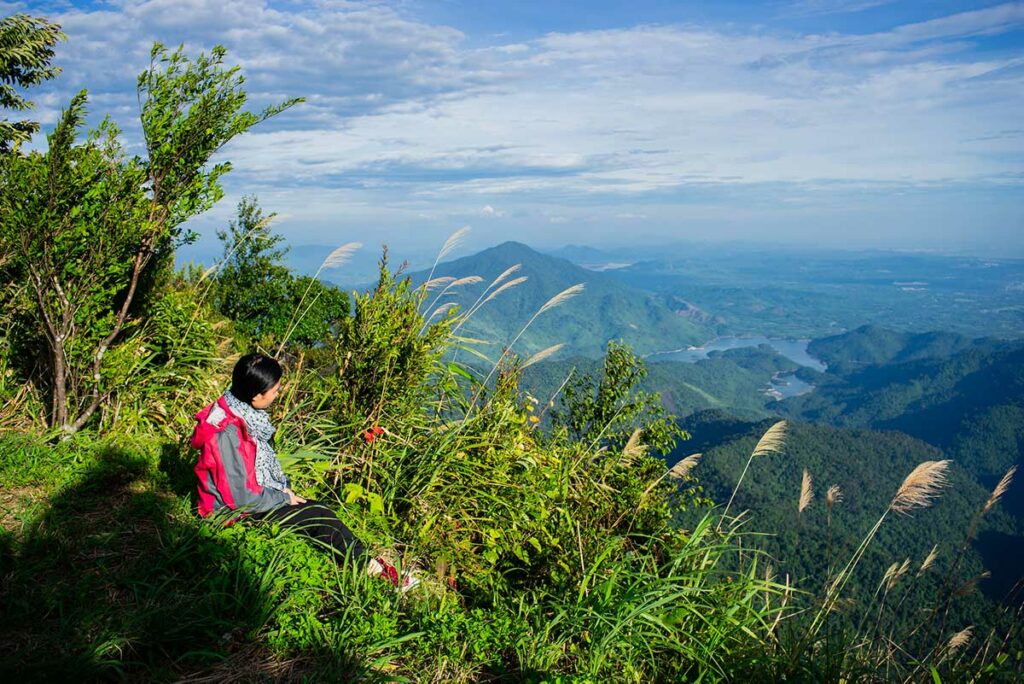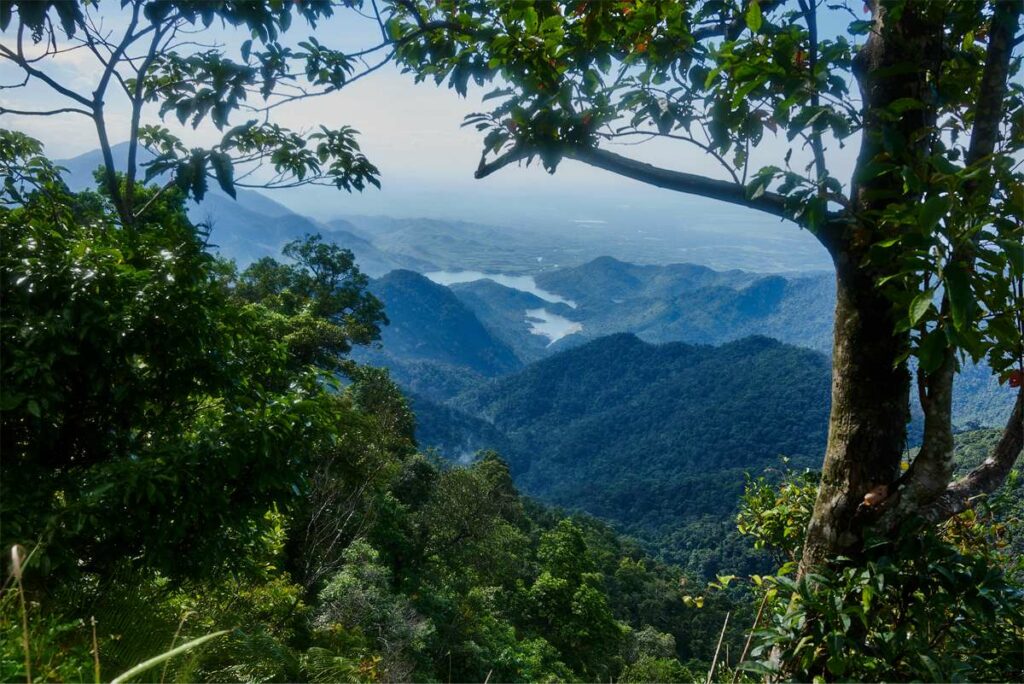What is Bach Ma National Park like?
Location and size
Bach Ma National Park is located in Thua Thien Hue Province, almost exactly halfway between Hue and Da Nang. The park covers around 37,500 hectares (375 km²) and rises from sea level to 1,448 metres at its highest point, Bach Ma Peak. Its position on the biogeographical border between northern and southern Vietnam means it contains a rare combination of both regions’ climates and ecosystems, creating exceptional biodiversity within a relatively compact area.
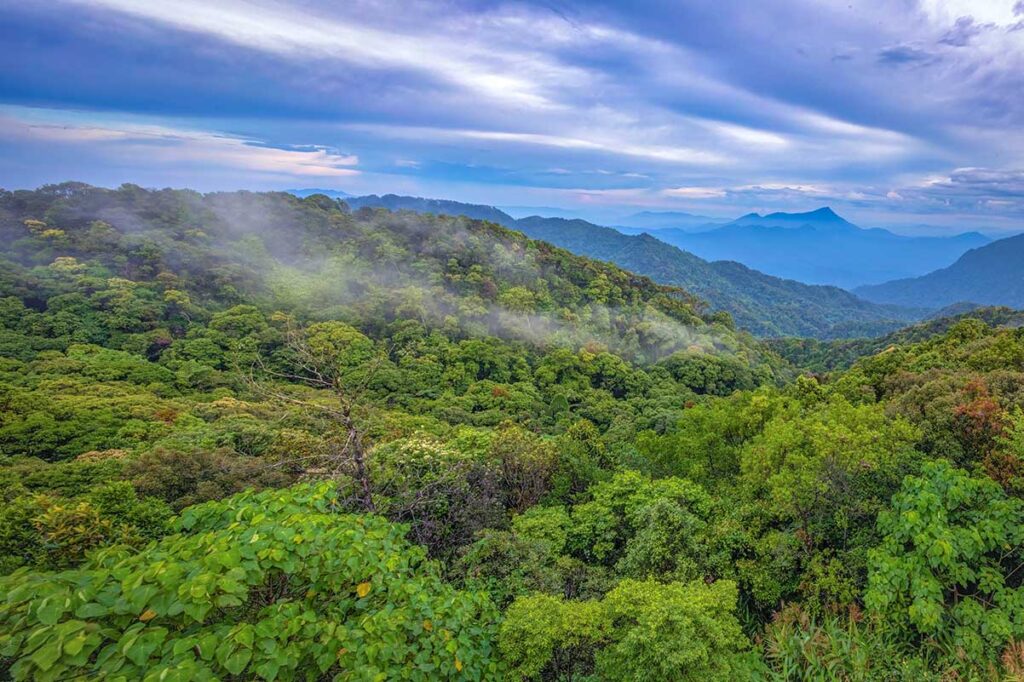
A brief history
In the 1930s, French colonists developed Bach Ma as a hill station to escape the summer heat of Hue. At its height, the area had over 130 villas, a post office, shops, and walking paths, earning it the nickname “the Da Lat of Central Vietnam.” After decades of abandonment and heavy damage during the Vietnam War—including defoliation from Agent Orange and fierce fighting—the buildings fell into ruin. Bach Ma was officially established as a national park in 1991, with the goal of restoring its forests and protecting its wildlife.
Nature and wildlife
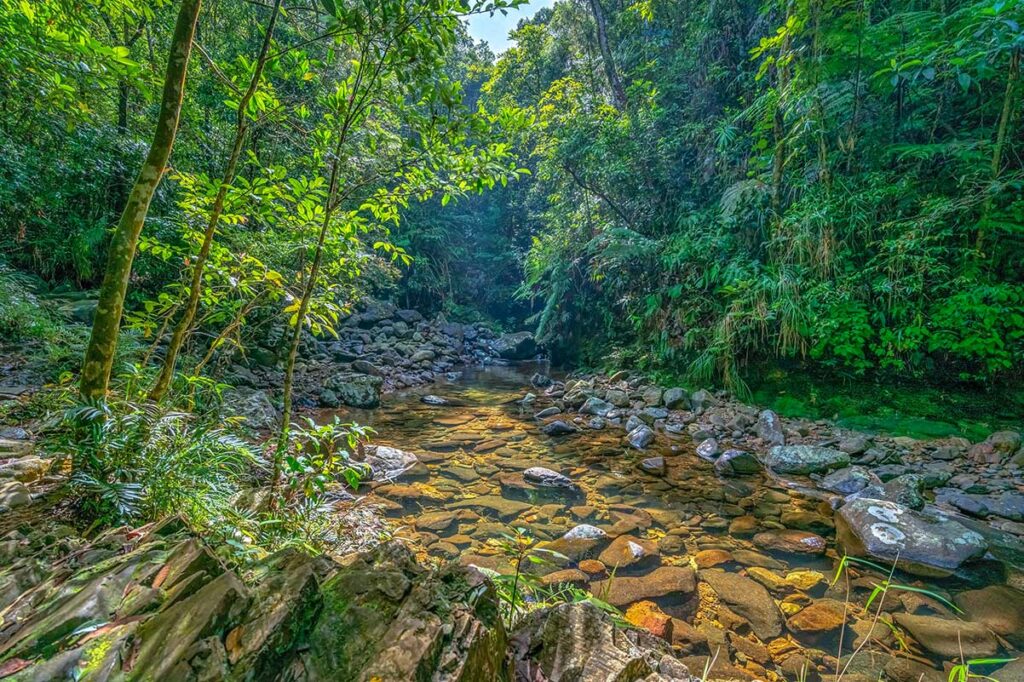
The park’s landscapes range from coastal lagoons and lowland forests to misty cloud forests at higher elevations. Its flora includes rhododendrons, orchids, and valuable tropical hardwoods, many of which are threatened elsewhere in Vietnam.
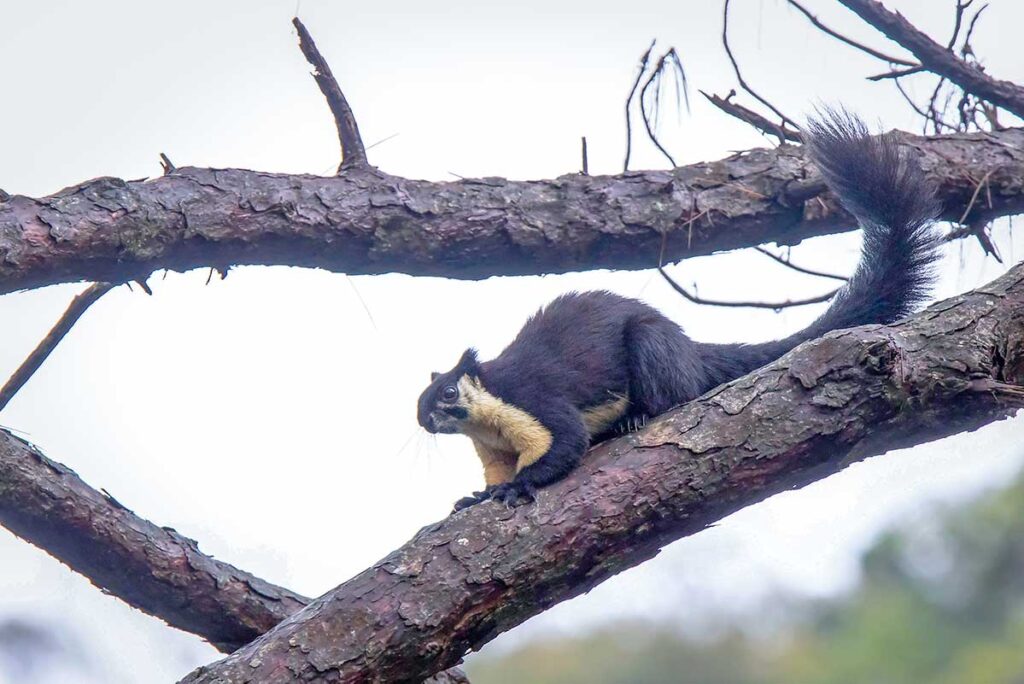

Bach Ma is also home to rare and endangered species such as the red-shanked douc langur, Edwards’ pheasant, and Vietnamese crested argus. With more than 350 species of birds, it is considered one of Vietnam’s premier birdwatching destinations.
Practical visiting information
Entrance fee
The current entrance fee for Bach Ma National Park is 65,000 VND per adult and 20,000 VND per child. If you arrive with your own vehicle, note that personal motorbikes and cars are not allowed to drive all the way to the summit after the early morning. Instead, you must either hire the park’s official 4WD shuttle (fixed price of around 900,000 VND per vehicle, shared between passengers) or walk the steep 15 km road uphill from the entrance.
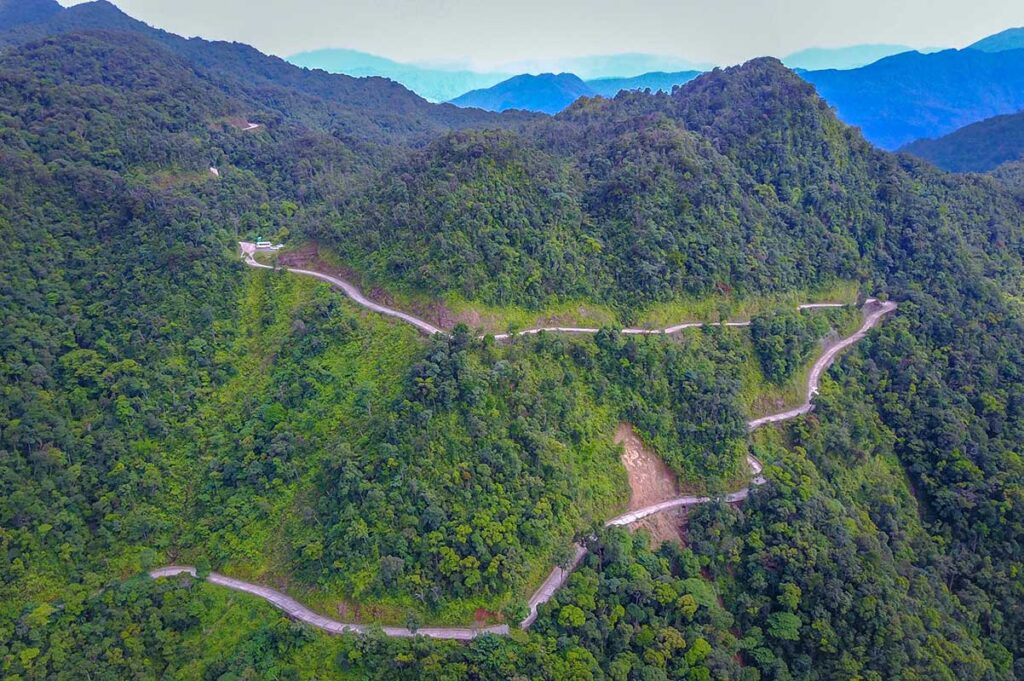
Opening times
The park is open daily from 07:00 to 17:00. Arriving early not only avoids the heat but also gives you more time to complete trails before closing.
Time needed to explore
- Half-day trip – Best for the summit viewpoint (Hai Vong Dai) plus one short trail such as the Five Lakes or Do Quyen Waterfall.
- Full-day trip – Allows time for both the Five Lakes and Do Quyen Waterfall trails, with a summit visit.
- Overnight stay – Ideal for camping or staying in a guesthouse near the park to enjoy sunset, sunrise, and quieter early-morning birdwatching.
What to wear
Lightweight, breathable clothing is best, but long sleeves and trousers are recommended for protection against insects and leeches. Wear sturdy hiking shoes with good grip, and bring a light jacket as it can be cooler at higher elevations.
Essentials to bring
Carry enough water and some snacks or a packed lunch, especially if you plan to hike longer trails. Bring insect repellent, rain protection (poncho or lightweight jacket), swimwear if you plan to swim in the lakes, and a small daypack to keep your hands free.
How to get there
Guided vs by yourself
Hiring a guide can make your visit more efficient and rewarding. A good guide will optimise your time, select the most scenic and suitable trails, share insights about the park’s history and wildlife, and handle logistics such as arranging the summit shuttle. Joining a small guided group can also be cheaper than arranging private transport on your own.
If you only plan to visit basic highlights like the summit viewpoint (Hai Vong Dai) and short, well-marked trails such as the Five Lakes or Do Quyen Waterfall, going self-guided is perfectly manageable, especially if you’re confident navigating with a map or GPS.
By tour
Day tours to Bach Ma National Park run from both Hue and Da Nang, making it easy to include the park in your itinerary without arranging transport yourself. Tours usually include hotel pick-up and drop-off, park entrance fee, summit shuttle, a guide, and lunch. This is the most convenient option if you want a hassle-free day and don’t plan to drive.
Bach Ma National Park Tour – Trekking & Waterfalls
- Experience Trekking trails, Five Lakes swim, and the 300-meter Do Quyen Waterfall.
- Includes Guided tour with transport from Hue, Da Nang, or Hoi An.
Private car with driver
A private car and driver offers the most flexibility, allowing you to set your own departure time and pace. Expect prices from 1,000,000–1,500,000 VND for a round trip from Hue, and slightly more from Da Nang. The driver will drop you at the park entrance, where you’ll need to arrange the park shuttle to reach the summit area.
Driving motorbike
For experienced riders, motorbiking from Hue (about 1–1.5 hours) or Da Nang (about 2 hours) can be a scenic and enjoyable journey, especially over the Hai Van Pass. From either city, follow National Highway 1A to Phu Loc, then look for the blue Bach Ma National Park sign and turn inland to the park entrance. Be aware that motorbikes are not allowed past the entrance gate—you’ll still need to walk or take the park’s shuttle to reach the higher trails. Road conditions are generally good, but the weather can change quickly, so ride with caution.
Best things to do & see in Bach Ma National Park
1. Hai Vong Dai (Bach Ma Peak)
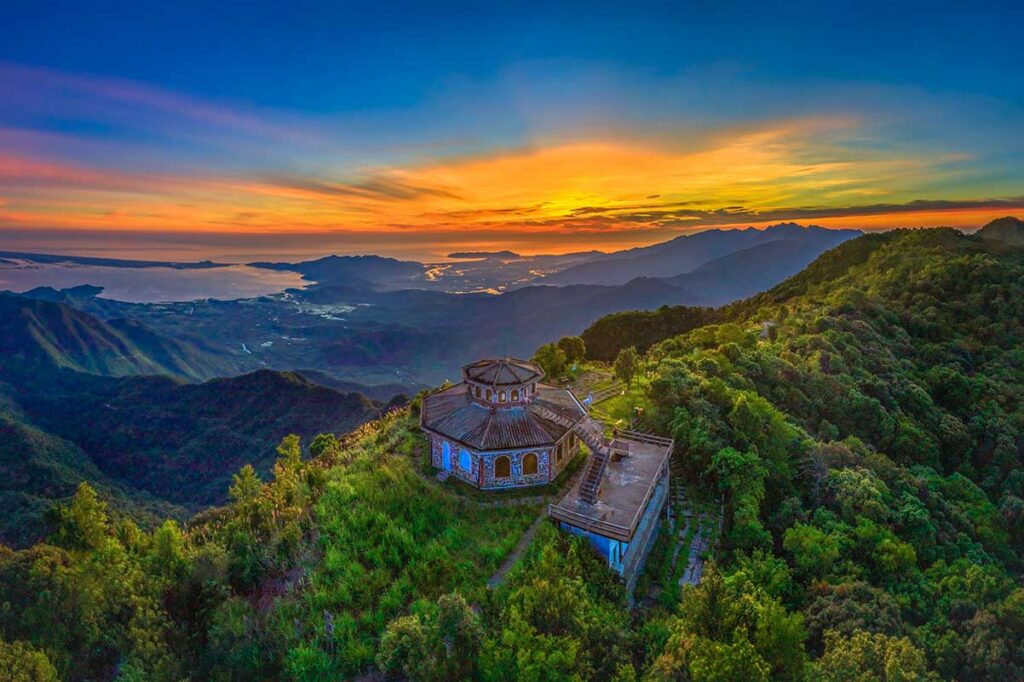
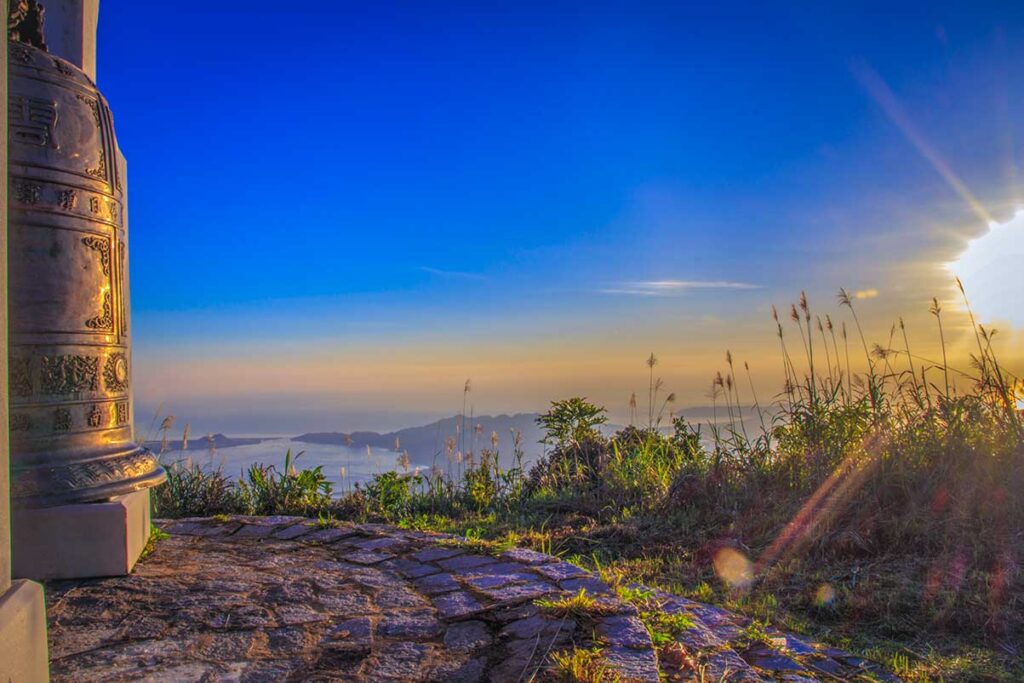
At 1,448 metres, Bach Ma Peak is the highest point in the park and offers sweeping views of Lang Co Beach, Hai Van Pass, Truoi Lake, and the surrounding mountains. On clear days, you can see all the way to Da Nang. Access is via the park’s shuttle from the entrance, followed by a short paved path. Early morning is best for cooler air and clearer views before clouds roll in.
2. Ngu Ho (Five Lakes)
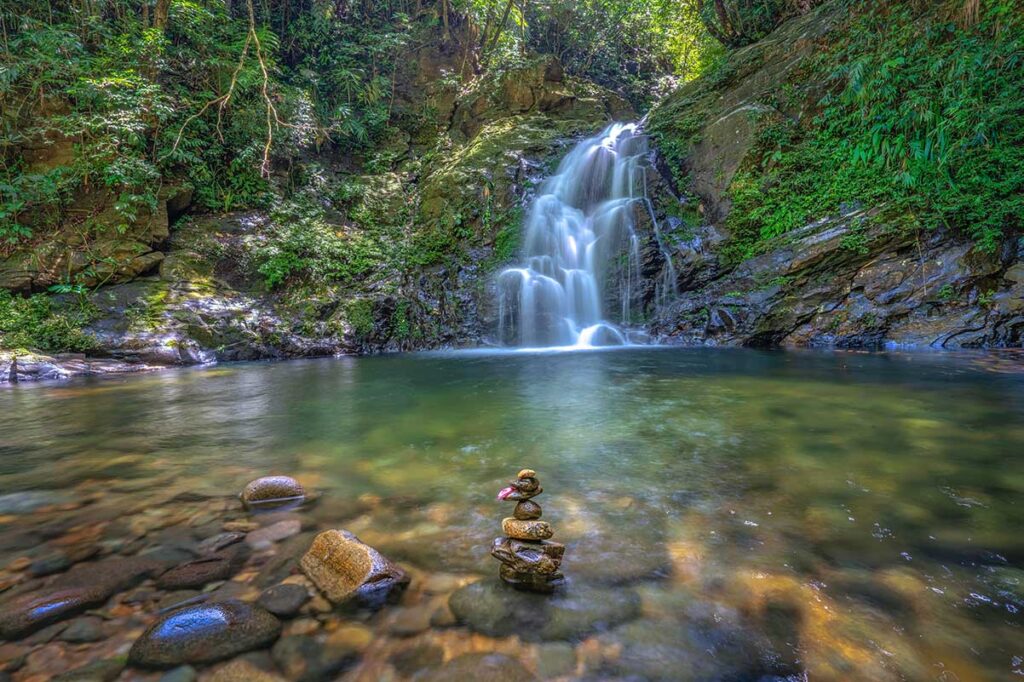
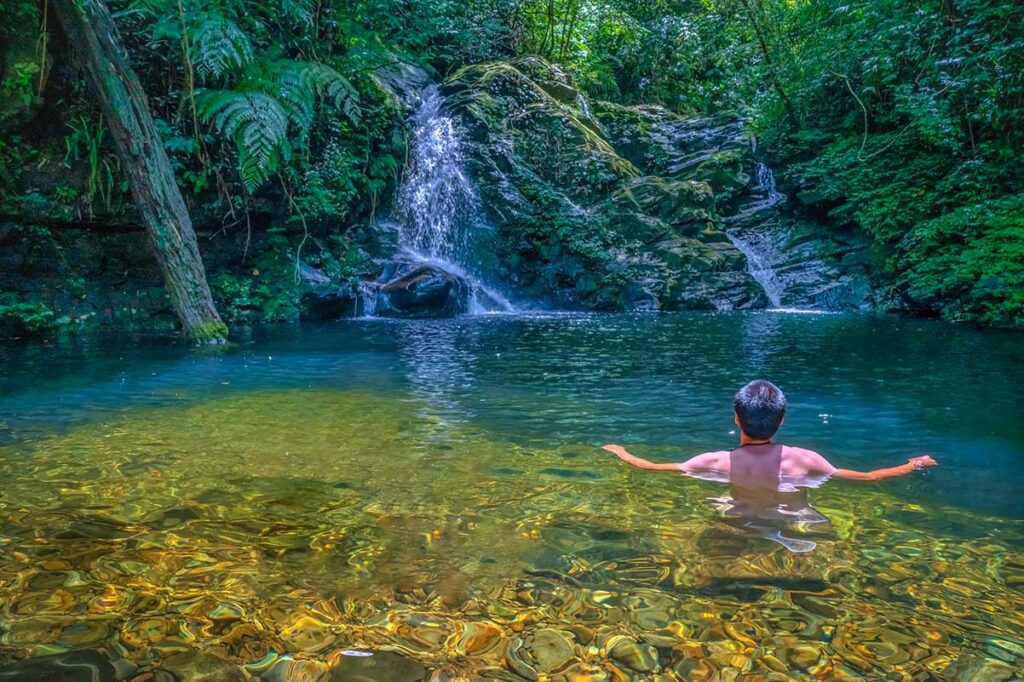
This series of five emerald-green pools lies in shaded forest, fed by cool mountain streams. The third lake is a favourite for swimming, with clear water and a natural rock ledge to sit on. The trail is about 2 km with rocky, uneven terrain. An optional “adventure” section involves rope-assisted crossings and scrambling over boulders, but there is an easier bypass. In the rainy season, currents can be strong, so swimming is best in the dry months.
3. Do Quyen Waterfall
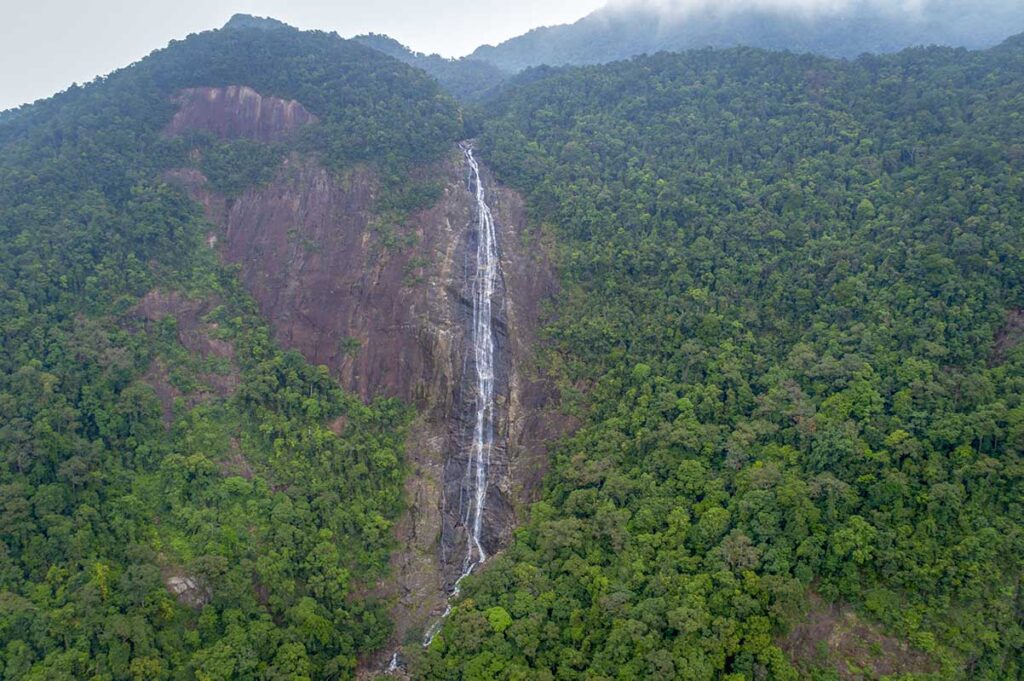
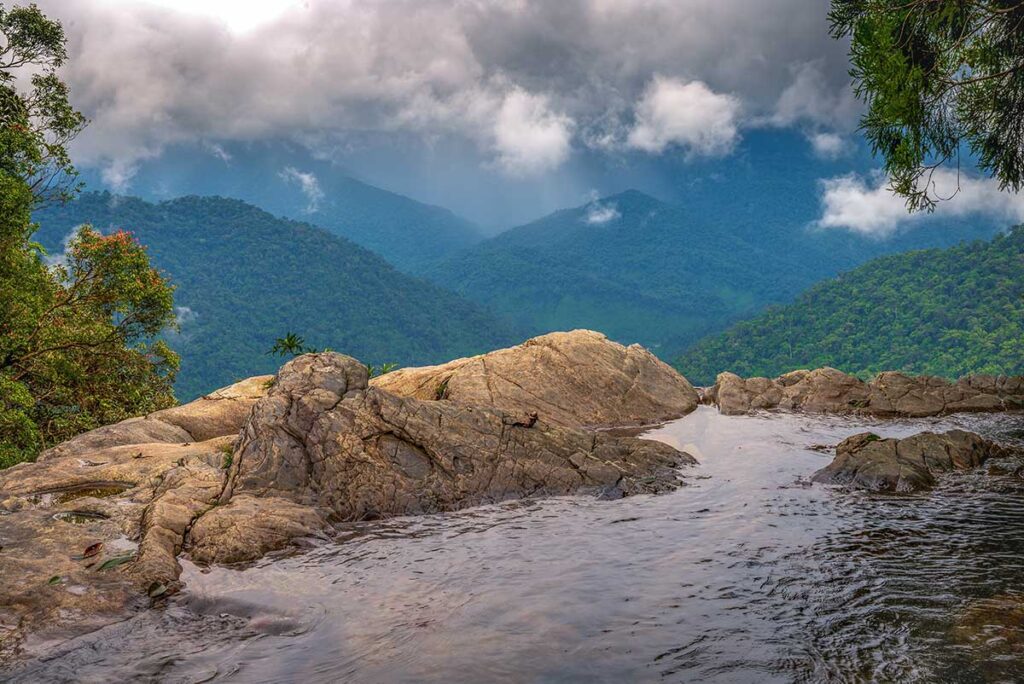
One of Bach Ma’s most striking sights, this waterfall plunges over 300 metres into a forested gorge. In March and April, the cliffs are lined with blooming rhododendrons. The viewing platform at the top offers a dramatic panorama, but the real challenge is the descent down more than 600 steps to the base. The climb back up is steep and tiring, so allow extra time. Trails can be slippery after rain.
4. Trekking
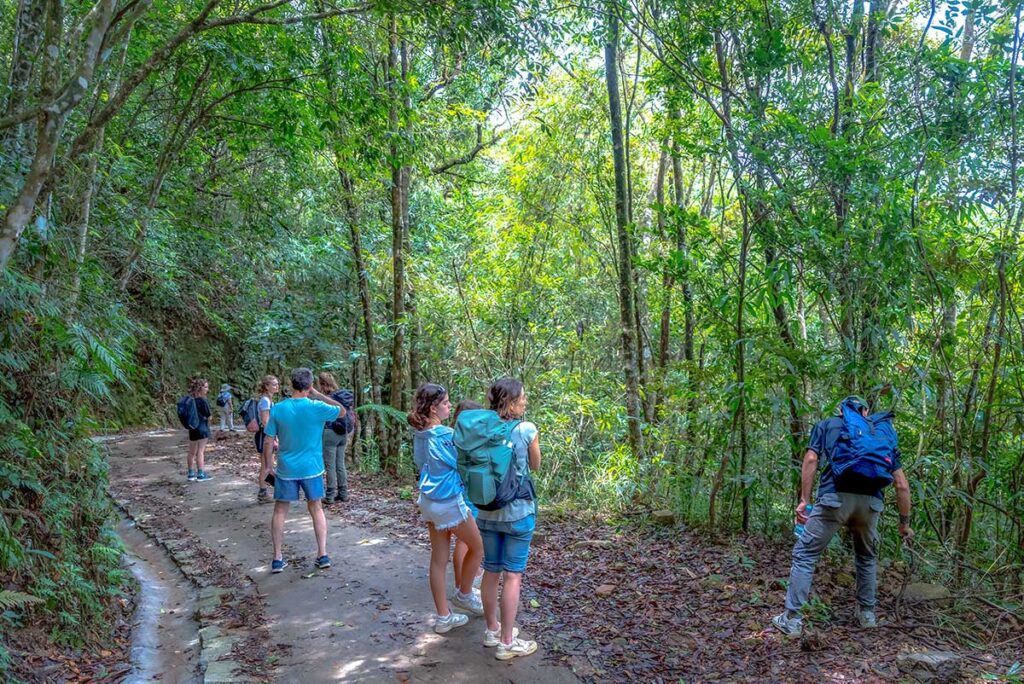
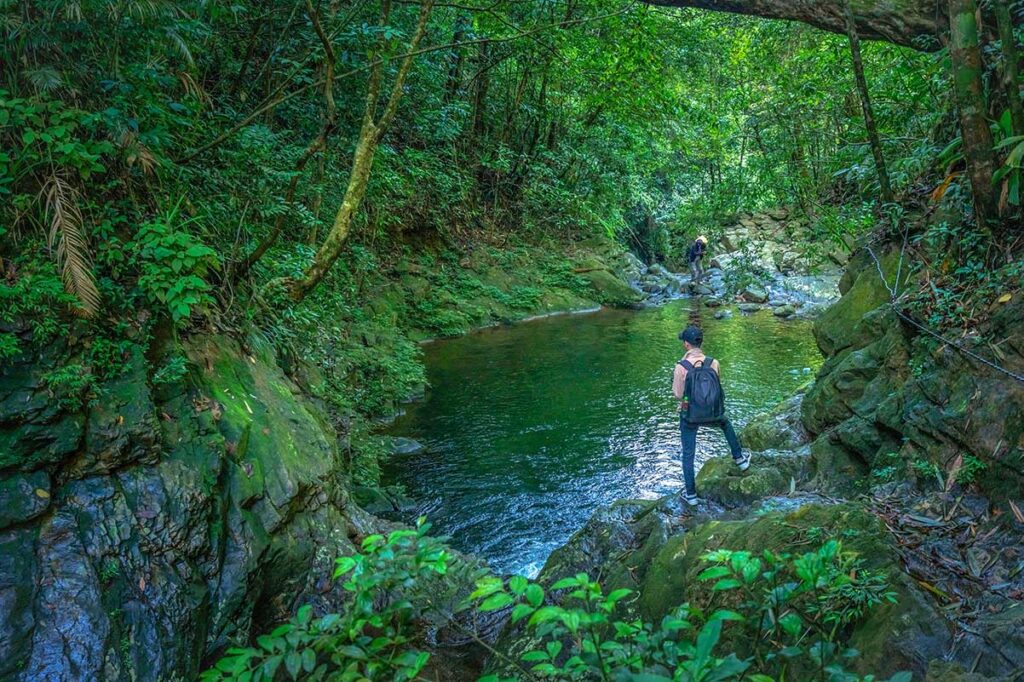
Bach Ma National Park offers a network of trails for different fitness levels, from short walks to challenging hikes. Trekking here takes you through misty forests, past waterfalls, and along streams, with plenty of opportunities to spot wildlife and enjoy the cooler mountain air. Most trails are well-marked, but a guide can help you find hidden viewpoints or lesser-known routes.
5. Birdwatching
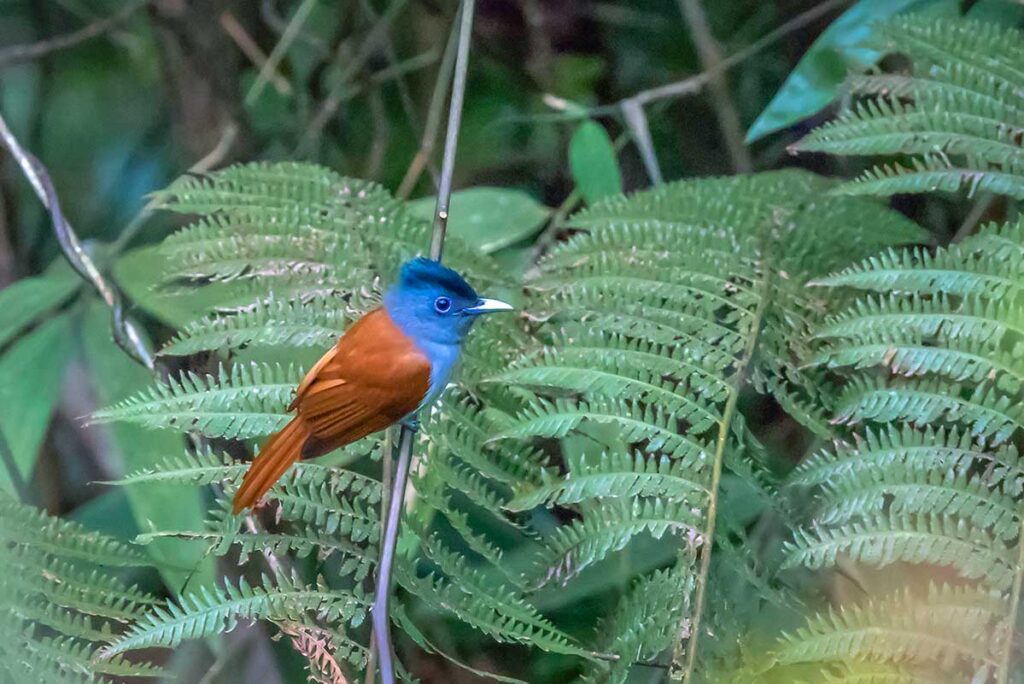
With more than 350 species recorded, Bach Ma is one of Vietnam’s top birding destinations. You can see colourful sunbirds, hornbills, and flycatchers throughout the year. The lower forest edges and early-morning summit area are prime spots. Hiring a local birding guide greatly improves your chances of spotting rarer species like the Crested Argus or Edwards’ Pheasant.
6. French Villas
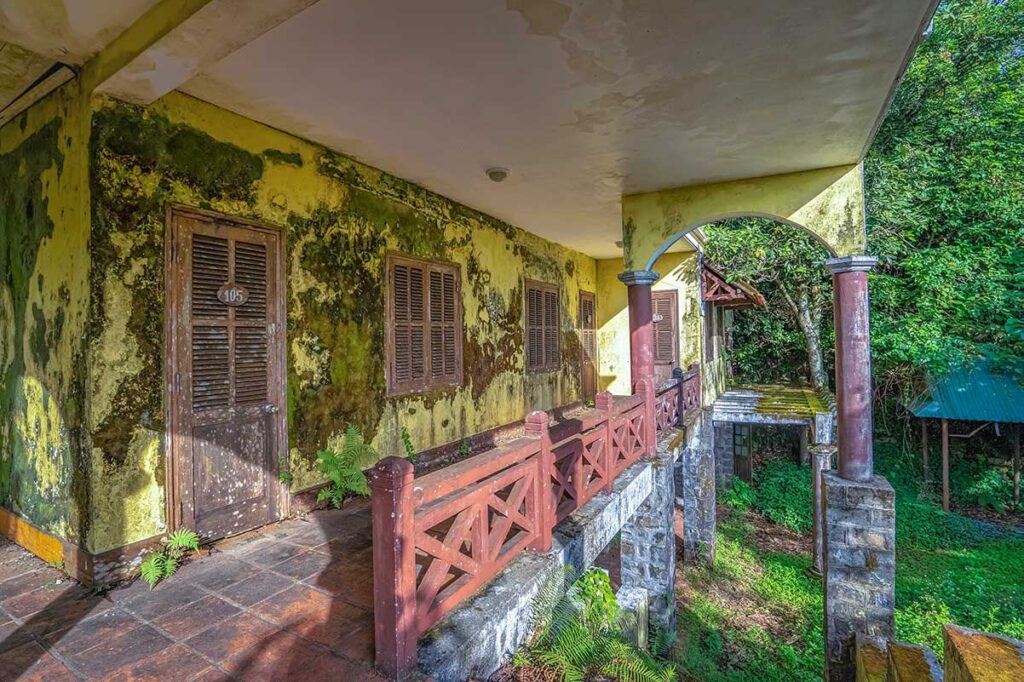
Scattered near the summit are the moss-covered ruins of French colonial villas from the 1930s hill station days. Many have only stone walls left, but they add an atmospheric glimpse into the park’s past. They are easily visited as part of a short walk from the summit road.
7. Viet Minh Tunnels
Located in the lower park, these 140-metre tunnels were used during the Vietnam War between 1973 and 1975. They are not maintained and may house snakes and insects, so entering is not advised, but they can be viewed from outside.
8. Truc Lam Bach Ma Zen Monastery
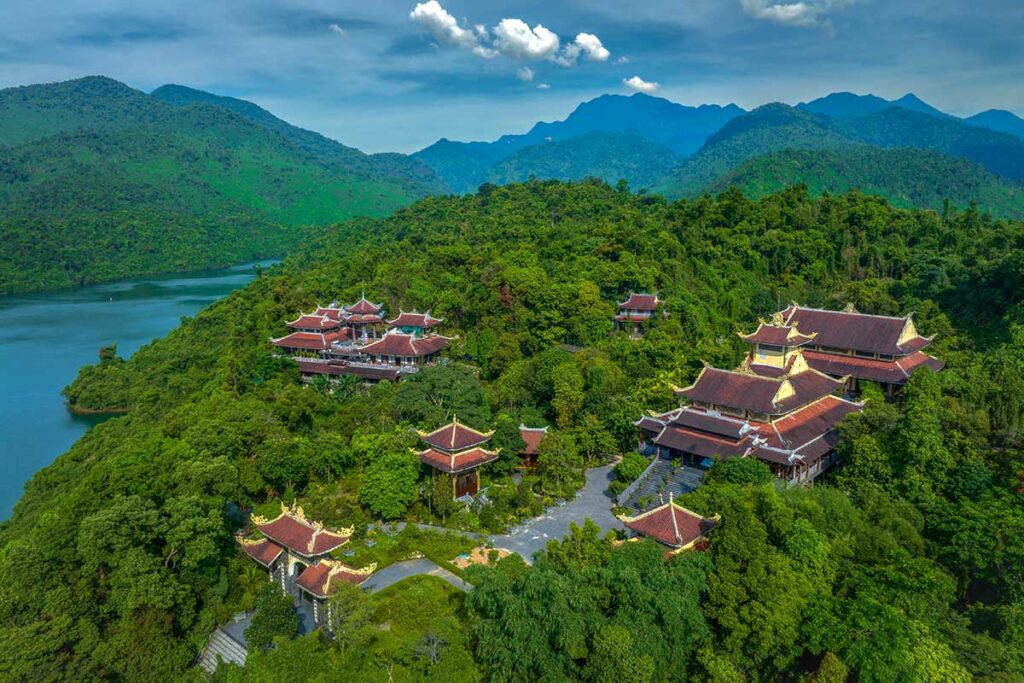
Set beside Truoi Lake at the base of the mountain, this peaceful monastery is reached by a 15-minute boat ride followed by 172 steps. The complex features traditional Vietnamese architecture, serene gardens, and a large meditating Buddha statue. It’s best visited on the way to or from the park, especially if travelling by private car.
Best trekking trails in Bach Ma National Park
Bach Ma National Park has a range of trails that suit both casual walkers and experienced hikers. Most routes are surrounded by lush forest, offer plenty of shade, and lead to highlights such as waterfalls, lakes, and viewpoints. While some are short and easy, others include steep climbs or rope-assisted sections. Here are the park’s main trekking options:
Rhododendron Trail
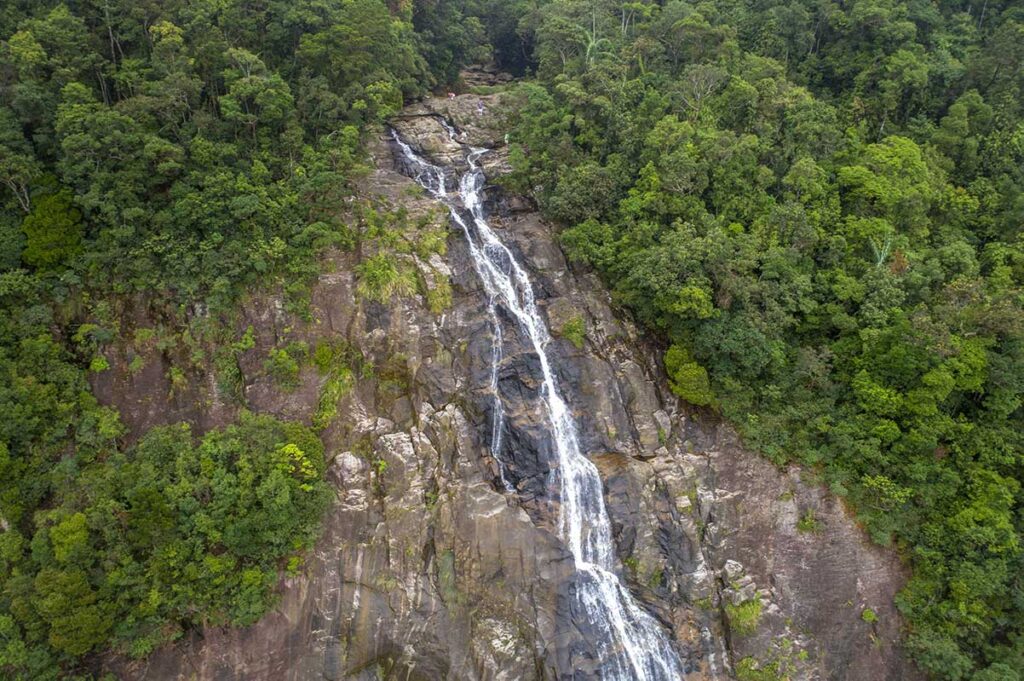
- Length & difficulty: Around 6 km round-trip, moderate difficulty.
- Highlights: Leads to the dramatic Do Quyen Waterfall; especially beautiful in March–April when rhododendrons bloom along the cliffs.
- Access: Trailhead near the 10 km mark along the summit road; can be reached by park shuttle or by hiking up from the entrance.
Five Lakes Trail
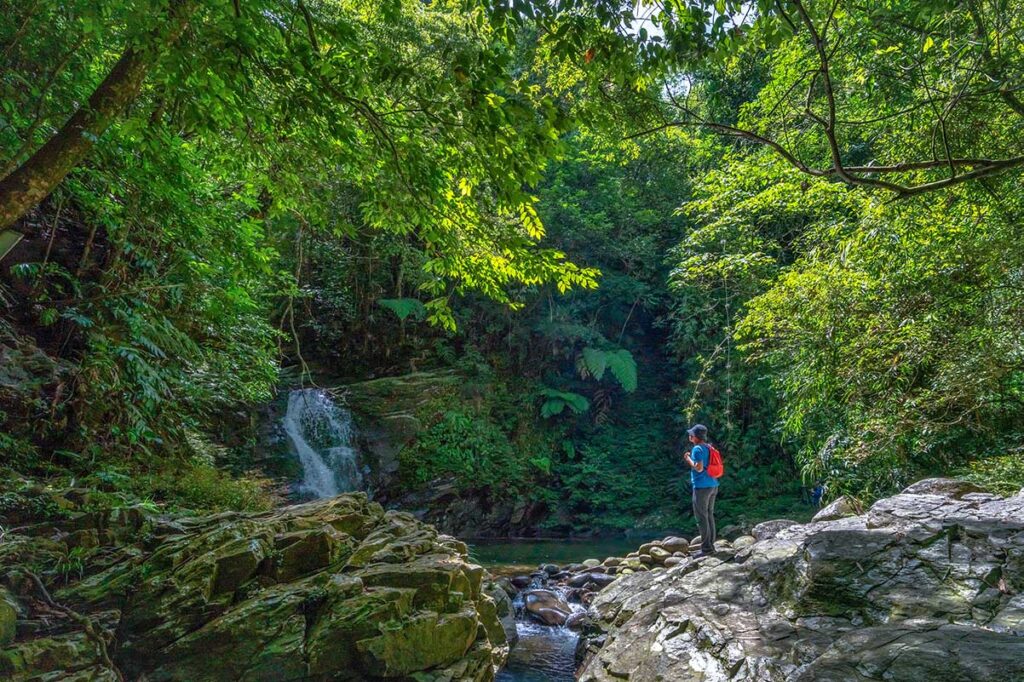
- Length & difficulty: Approx. 3 km if visiting all lakes; moderate difficulty with some slippery sections.
- Highlights: Links five scenic pools; lake #3 is popular for swimming.
- Adventure bypass: Rope-assisted stream crossings and rock scrambles can be avoided via an easier alternate path.
Pheasant Trail
- Length & difficulty: About 2.5 km, easy to moderate.
- Highlights: Runs through lowland forest along streams; good chance of spotting birds, including the rare Crested Argus or Edwards’ Pheasant.
- Best time: Early morning for the highest chance of wildlife sightings.
Summit Hike (Entrance to Hai Vong Dai)
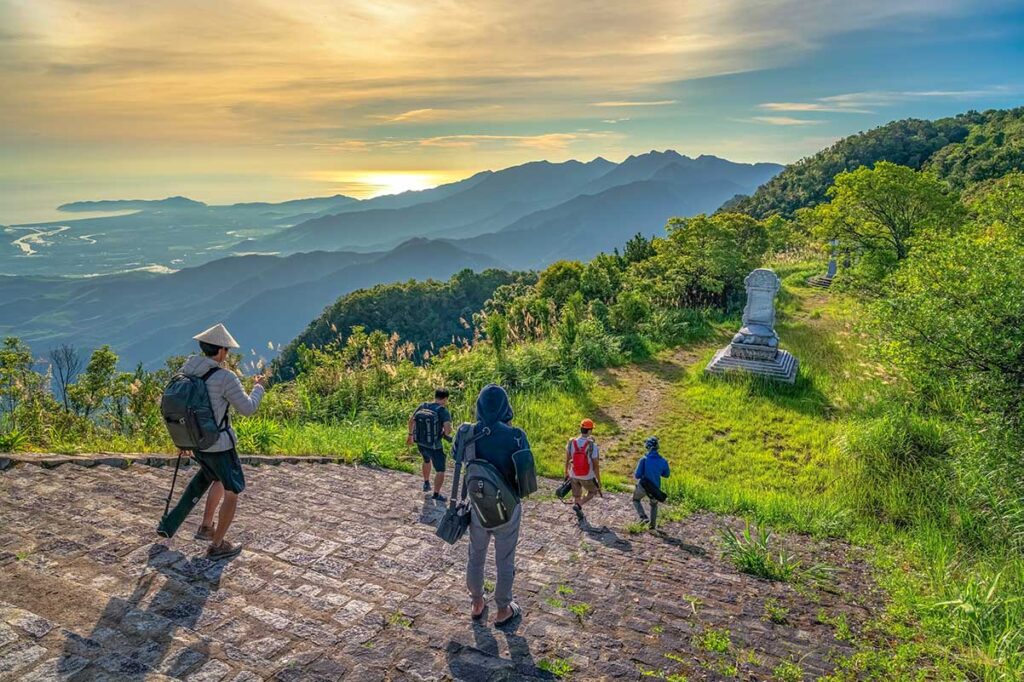
- Length & difficulty: 15 km uphill on paved road; strenuous due to incline and exposure.
- Highlights: A challenging way to reach the summit for those who want a full-day workout.
- Tip: Most visitors take the park shuttle and walk only the final stretch to the summit.
Where to stay
Hue City
Hue is the most popular base for visiting Bach Ma National Park, with a wide range of hotels, guesthouses, and homestays for all budgets. It’s about an hour’s drive to the park entrance, making it ideal for day trips while still enjoying the restaurants, nightlife, and cultural attractions of the city.
Camping
Camping is permitted in certain areas of the park, usually near designated rest spots or ranger stations. Expect a small camping fee of around 30,000 VND per adult. Facilities are minimal, so you’ll need to bring all your own gear, food, and water. Nights can be cool and damp, so pack accordingly.
Nearby homestays
At the foothills of Bach Ma Mountain, there are a few simple homestays run by local families. These offer basic comfort—fan rooms, shared bathrooms, home-cooked meals—and a chance to experience rural life. Staying here can also save time if you plan to start your visit early.
Hotels/guesthouses in Lang Co or Phu Loc
Lang Co Beach and the town of Phu Loc are both within 30–40 minutes of the park entrance and have a mix of small hotels, guesthouses, and resorts. Lang Co is a good choice if you want to combine your park visit with beach time, while Phu Loc is a quieter option close to both the park and the main highway.
Is Bach Ma National Park worth visiting?
Bach Ma National Park is a great stop if you’re looking for a cooler mountain climate, scenic viewpoints, and a variety of attractions within a relatively compact area. The mix of waterfalls, lakes, historic ruins, and birdwatching opportunities makes it appealing to a wide range of travellers. It’s also one of the easiest national parks in Vietnam to access if you’re travelling between Hue and Da Nang.
That said, there are some downsides. The mandatory park shuttle to the summit adds a noticeable cost, especially for small groups, and some visitors feel the number of trails is limited for serious hikers. Infrastructure in parts of the park can be basic, and certain facilities are in need of upkeep.
Overall, Bach Ma is most rewarding if you’re already travelling in Central Vietnam and want a day or two of nature between cultural stops. It won’t feel as wild or remote as national parks in Vietnam’s far north, but its accessibility, scenery, and unique mix of natural and historical features make it a worthwhile addition to many itineraries.
